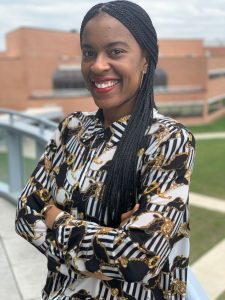
Adaku Ume, a student in the M.D./Ph.D. dual-degree program in biomedical sciences in the Boonshoft School of Medicine, has received several research fellowships.
Forgive Adaku Ume if she feels she has an embarrassment of riches because, in a way, she has.
A dual M.D./Ph.D. student, Ume is thankful to have received not one but two prestigious yet competitive fellowships. Moreover, one of those fellowships gained an additional distinction because of her stellar studies.
Ume, a native of Southern California, earned a bachelor’s degree in cell and developmental biology from the University of California, Santa Barbara, and a master’s degree in pharmacology from Georgetown University in Washington, D.C.
In 2017, she enrolled in the Wright State University Boonshoft School of Medicine and is in her sixth year, completing the Ph.D. component through the Department of Neuroscience, Cell Biology and Physiology.
She was initially attracted to Wright State at the suggestion of mentors “back home in California,” she said.
She ultimately landed a spot in the Kidney Pathophysiology Research Group, led by Clintoria Williams, Ph.D., associate professor of neuroscience, cell biology and physiology, a lab where she felt her talents would be cultivated. Under Williams’ mentorship, Ume is investigating how a class of immunosuppressant drugs causes irreversible kidney damage and dysfunction.
Here’s where the riches enter the picture. Ume recently received an F30 Fellowship award from the National Institute of Diabetes and Digestive and Kidney Diseases, a federal subdivision of the National Institutes of Health.
The F30 award provides support for students training to become physician-scientists. Her highly coveted award includes financial support for four years of training, educational resources and a monthly stipend. Ume is quite thankful that two words will no longer be such a heavy burden: “educational loans.”
She also received a Porter Physiology Development Fellowship Award from the American Physiological Society, good for one year. In addition, the society designated Ume as an Eleanor Ison Franklin Fellow for having the highest-ranked renewal application.
In giving her reaction to these great achievements, Ume mainly credits her faith in God. “All of this is happening because I’m choosing to be obedient to Him,” she said. “I let His strength flow through me so people can see His power and be drawn to Him.”
Ume added, “I truly feel blessed to have a sharp — and kind — mentor in Dr. Williams and my thesis committee,” who she affectionately calls “The Fab 5.”
“They continue to challenge, support and advocate for me,” she said. “The faculty, administrative staff and my colleagues at Wright State have really made this experience one to cherish.”
“One thing that surprised me,” she continued, “is how much fun scientific communication can be. We gather our findings and generate data, but it only matters if it gets out to the world, in a manner that Dr. Williams coined ‘data to knowledge.’ God has blessed me with creativity, so I enjoy finding creative ways to communicate my research endeavors.”
Ume has specific specialties in mind that she is considering as a physician. However, her main focus right now is the successful completion of her Ph.D. in biomedical sciences.
She looks forward to a career as a physician-scientist, where she can utilize her investigational skills to answer some of the questions that remain in medicine. “When your research improves someone’s quality of life, that’s a win,” she said.
Ume has won in finding a mentor and team of advisors at Wright State and considers it a “privilege to learn how God crafted us on a molecular level.”

 Wright State alum Lindsay Aitchison fulfills childhood space-agency dream
Wright State alum Lindsay Aitchison fulfills childhood space-agency dream  Wright State business professor, alumnus honored by regional technology organizations
Wright State business professor, alumnus honored by regional technology organizations  Wright State University Foundation awards 11 Students First Fund projects
Wright State University Foundation awards 11 Students First Fund projects  Gov. DeWine reappoints Board Treasurer Beth Ferris and names student Ella Vaught to Wright State Board of Trustees
Gov. DeWine reappoints Board Treasurer Beth Ferris and names student Ella Vaught to Wright State Board of Trustees  Joe Gruenberg’s 40-Year support for Wright State celebrated with Honorary Alumnus Award
Joe Gruenberg’s 40-Year support for Wright State celebrated with Honorary Alumnus Award 